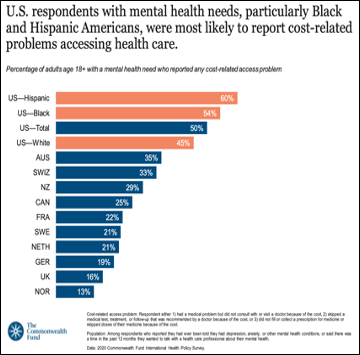Access to Mental Health Care — US worst among wealthy countries
October 12, 2021
Summary: World Mental Health Day was October 10th. How is the US doing on access to care? Terribly. Therapists often don’t take insurance, and we lead wealthy nations in financial barriers to care: fully 50% of those in need. Single payer would provide a strong behavioral health benefit.
Why It’s So Hard to Find a Therapist Who Takes Insurance
The Wall Street Journal
October 5, 2021
By Andrea Petersen
Especially in big cities such as Los Angeles, New York and Washington, D.C., demand for mental-health care is so strong that many experienced therapists don’t accept any insurance plans, they say. They can easily fill their practices with patients who would pay out of pocket, they add. Therapists who do take insurance are often booked up. And in many smaller towns and rural areas, there are few mental-health professionals at all.
Mental Health Care Needs in US and 10 Other High-Income Countries The Commonwealth Fund
October 8, 2021
By Reginald D. Williams II, Arnav Shah
The following charts show that, across the countries, large shares of people with mental health needs: … have high rates of cost-related problems accessing care, especially among US Black and Latinx/Hispanic adults.

Comment by: Isabel Ostrer
World Mental Health Day was on October 10, so we ought to look at mental health care access in the United States. The findings are, unfortunately, discouraging.
As the WSJ article points out, finding a therapist who will take your insurance is difficult. There’s no requirement for mental health providers to accept insurance. And, in fact, they often make more by not taking it, thus incentivized to accept only patients who have the means to pay out of pocket.
It’s no wonder that the US fares poorly among peer high-income nations when it comes to mental health. The Commonwealth Fund survey finds that white and Black US adults have the highest rates of mental health needs in these countries. And US adults with mental health needs were the most likely to report a cost-related problem accessing health care. Black US adults with mental health needs use the emergency room – a suboptimal setting – at disproportionately high rates.
As we reflect on World Mental Health Day, the US has plenty to learn from peer countries. Perhaps most fundamentally is that we must broaden access to mental health treatment and providers. A single payer system would achieve this by ensuring all Americans have access to a standardized package of behavioral health care services.
You might also be interested in...
Recent and Related Posts
Premier Medical Journal Scrutinizes Corporatization of US Health Care
Laying out the Ill-Effects of Medicaid Cuts in the Congressional Budget Bill
